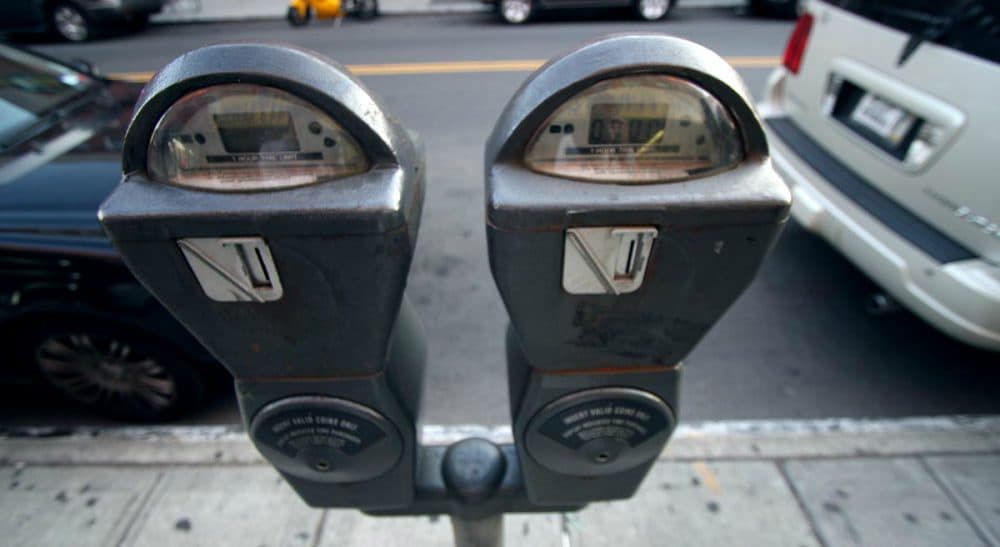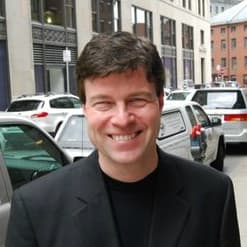Advertisement
The Brave New World Of Boston Parking

Boston Mayor Marty Walsh wants to emulate San Francisco, jacking up parking meter rates and even have them float up and down depending on demand and the time of day. Fees could be as high as $7 an hour. If you’re thinking this sounds like a back-door tax hike, a clever way for a revenue-hungry city to add to its coffers, you’re probably right. That notwithstanding, however, Walsh’s ideas make sense.
The coin-fed meters we all know and love produce some perverse behaviors. In downtown areas, parking garages often have plenty of spaces available, but motorists avoid them. The reason is that parking meters are dramatically cheaper. It costs $12 for an hour inside the Boston Common Garage. But if you’re lucky enough to find one of the metered spaces that line the roadway entering the garage, you’ll only pay $1.25. That difference (almost 1000 percent more!) is big enough that all but the rich or those on expense accounts will keep looking for a meter, circling city blocks, hoping to spot a car about to pull out of a space. Indeed, the phenomenon is so common that several traffic studies have found that an average of 30 percent — and sometimes as high as half — of all cars on downtown streets are cruising for parking. The results are congested streets, wasted fuel, increased air pollution and surly motorists.
coin-fed meters ... produce some perverse behaviors.
Moreover, the system itself is unfair. Those lucky enough to see a car leaving can snag a cheap spot. Others — late for appointments or perhaps just frustrated — give up and pay the far higher garage rates.
But, just as the wonders of technology have changed everything from taking taxis to making travel plans, so too our digital age is transforming the lowly parking meter. Meters can now take credit cards. They can be connected to the internet. They can be made smart, knowing, for example, if cars are parked next to them or not.
It’s this brave new world of parking that enthralls City Hall. With the new meters, rates can be adjusted on the fly, going up as demand increases and dropping when there are few cars searching for spaces. (This kind of “surge” pricing is the same strategy employed by Uber and Lyft as well as by many public transit systems around the country.) Smartphone apps feeding off information from meters could tell drivers where to find empty spots (much like the ill-fated Haystack, a parking app that caused controversy a year ago). Any economist would tell you that such a scheme makes sense. Right now, inexpensive meter rates, fixed prices and a lack of information create excessive demand and traffic congestion. By closely matching price to supply and demand, spaces would be more fairly and efficiently allocated.
All of this runs headlong into a few objections, however. One is the attitude of many car owners: they want the world to cater to them. Roads should be free, gas should be cheap and parking should be plentiful. I’m not immune to that way of thinking myself, but the rational part of me knows that parking is a good like any other — and one I should be willing to pay for.
Granted, dropping quarters for parking is an old and comfortable habit. But Walsh is right to think it a habit worth changing.
Others protest that increasing meter fees is unfair, a burden on the poor. That objection is true, of course, but it’s true of any price change, be it food, housing or the cost of movies. The problems of poverty and low-wage jobs are urgent (and much the focus of the current presidential campaign), but they require different solutions than simply abandoning the price system.
And finally, city retailers fear that making parking more expensive will hurt their business, pushing customers out to suburban malls. Their concern is legitimate but also can be solved by the new, internet-connected meters. Very short-term parking — say 30 minutes — can be made cheap, encouraging people to shop but not spend the day wandering around. Or perhaps retailers could offer vouchers to customers that could be scanned at meters to reduce parking fees.
Granted, dropping quarters for parking is an old and comfortable habit. But Walsh is right to think it a habit worth changing. And despite the higher prices, my guess is drivers too would eventually find easier parking and less crowded streets a trade off worth their while.
